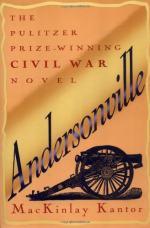We also got away from those murderous little brats of Reserves, who guarded us at Andersonville, and shot men down as they would stone apples out of a tree. Our guards now were mostly, sailors, from the Rebel fleet in the harbor—Irishmen, Englishmen and Scandinavians, as free hearted and kindly as sailors always are. I do not think they ever fired a shot at one of us. The only trouble we had was with that portion of the guard drawn from the infantry of the garrison. They had the same rattlesnake venom of the Home Guard crowd wherever we met it, and shot us down at the least provocation. Fortunately they only formed a small part of the sentinels.
Best of all, we escaped for a while from the upas-like shadow of Winder and Wirz, in whose presence strong men sickened and died, as when near some malign genii of an Eastern story. The peasantry of Italy believed firmly in the evil eye. Did they ever know any such men as Winder and his satellite, I could comprehend how much foundation they could have for such a belief.
Lieutenant Davis had many faults, but there was no comparison between him and the Andersonville commandant. He was a typical young Southern man; ignorant and bumptious as to the most common matters of school-boy knowledge, inordinately vain of himself and his family, coarse in tastes and thoughts, violent in his prejudices, but after all with some streaks of honor and generosity that made the widest possible difference between him and Wirz, who never had any. As one of my chums said to me:
“Wirz is the most even-tempered man I ever knew; he’s always foaming mad.”
This was nearly the truth. I never saw Wirz when he was not angry; if not violently abusive, he was cynical and sardonic. Never, in my little experience with him did I detect a glint of kindly, generous humanity; if he ever was moved by any sight of suffering its exhibition in his face escaped my eye. If he ever had even a wish to mitigate the pain or hardship of any man the expression of such wish never fell on my ear. How a man could move daily through such misery as he encountered, and never be moved by it except to scorn and mocking is beyond my limited understanding.




